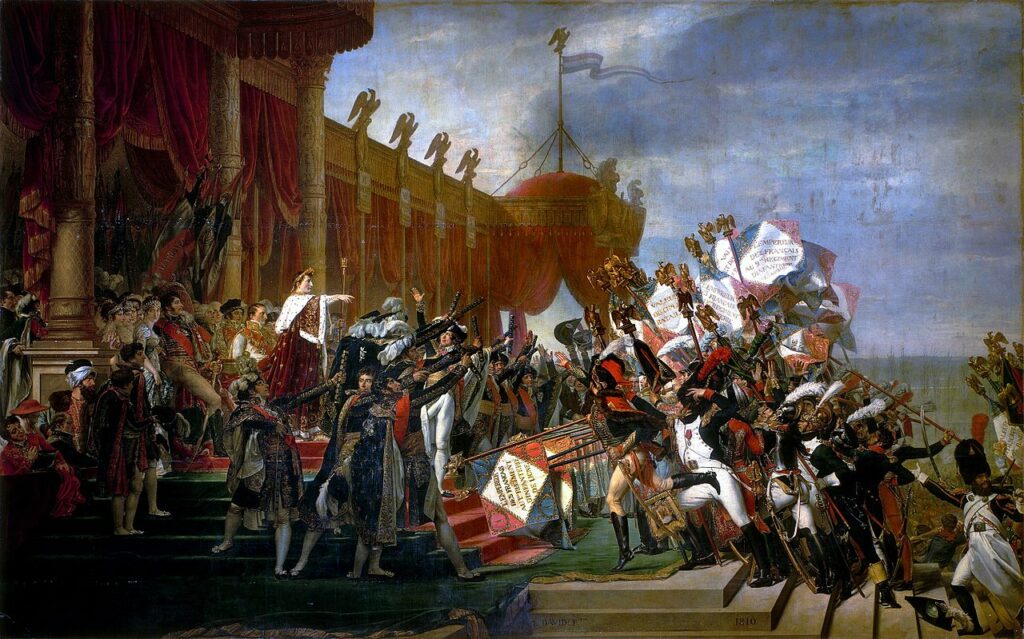Connected with the gods
Ich wandte die Flügel mit Wonne
Schon früh zur unsterblichen Sonne,
Kann nie an den Staub mich gewöhnen,
Ich bin mit den Göttern verwandt.
I happily turned my wings
Very young towards the undying sun,
I can never get used to the dust
I am connected with the gods.
A. W. von Schlegel, Lebensmelodien D 395
The speaker in this part of Schlegel’s strange ‘Melodies of Life’ is a golden eagle, explaining his role in nature and his satisfaction with his lot. His voice alternates with that of a swan, relishing the beauty of its graceful movements across the water. Both take pride in their connection with the king of the gods, Zeus / Jove, who seduced Leda in the form of a swan and raised Ganymede to the heavens in the form of an eagle.
The eagle’s association with sky gods is understandable. It reflects the idea of the all-seeing, ever observant eye in the sky surveying the lands inhabited by ‘lower’ creatures. The eagle’s seemingly unpredictable ability to swoop down and destroy life without warning also reflects the terror of sudden catastrophe pictured in images of Jupiter / Jove with his lightning bolt.
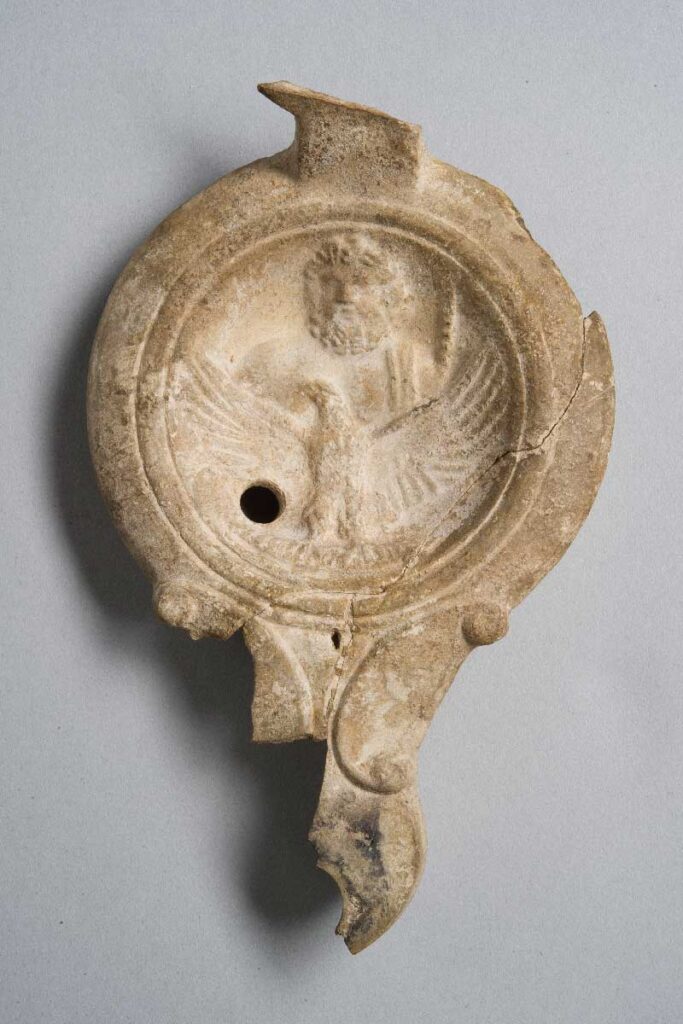
Michele Asuni, Jupiter and Eagle
The discus is decorated with a male figure (Jupiter) holding a staff or scepter. In front of Jupiter, one sees an eagle carrying a thunderbolt. In Greek and Roman mythology, the eagle served as Jupiter’s personal messenger, and it is said to have carried the youth Ganymede to Olympus, where he served as the gods’ cupbearer. Pliny the Elder also describes the eagle as one of the signa militaria, or “military symbols” (NH 10.6). As a symbol of Jupiter’s authority, an eagle would be set free during the consecration of an emperor—a ritual that culminated in his apotheosis. By flying into the air, the eagle was believed to carry the soul of the deified emperor to heaven, thus securing him a place among the gods.
https://archaeologicalmuseum.jhu.edu/class-projects/the-roman-house-at-hopkins/the-art-of-light/jupiter-and-eagle/
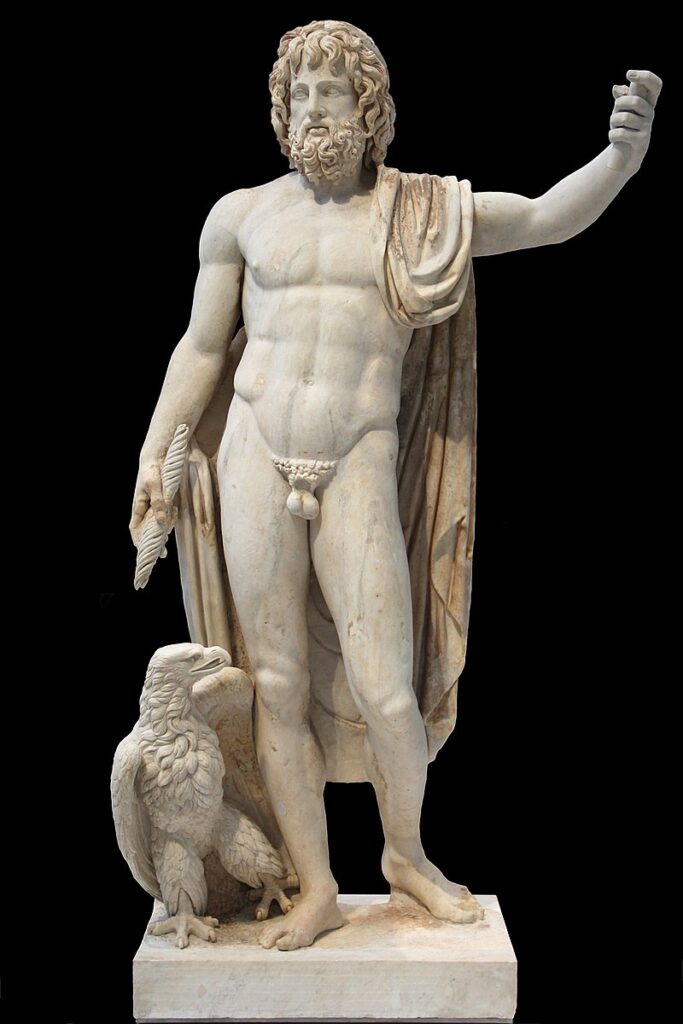
It was not just the classical, Mediterranean gods that were associated with eagles. Odin / Wodan has similar attributes. Although he is more commonly associated with ravens, according to Matthisson he also makes his presence known in the form of an eagle:
So lang im deutschen Eichentale,
Natur, dein hehrer Schauer webt,
Und bei des Mondes Geisterstrahle,
Der Adler Wodans mich umschwebt . . .
Will ich den Gram den Winden geben.
In this German oak valley, so long
As your noble mystery envelops me, nature,
And, by the ghostly light of the moon,
Wodan's eagle hovers around me . . .
I shall cast my cares to the winds.
Matthisson, Jünglingswonne D 983
Eagles as military symbols
Matthisson’s contemporary Klopstock had a similar interest in Teutonic and Norse traditions, and in ‘Hermann und Thusnelda’ he created a dialogue between the Teutonic hero Arminius (Hermann) and his wife as he returned from defeating the Romans at the Battle of the Teutoberg forest. The poem refers explicitly to the eagle standards of Legions XVII, XVIII and XIX that he had captured:
Ha, dort kömt er, mit Schweiß, mit Römerblut,
Mit dem Staube der Schlacht bedeckt. So schön war
Hermann niemals, so hat´s ihm
Nie von dem Auge geflammt.
Komm, ich bebe vor Lust, reich mir den Adler
Und das triefende Schwert. Komm, atm' und ruh hier
Aus in meiner Umarmung,
Von der zu schrecklichen Schlacht.
Ha, here he comes, covered with sweat, with the blood of Romans,
Covered with the dust of battle! This is the most beautiful
Hermann has ever been! This is the first time
His eyes have been ablaze like that.
Come, I am swooning with desire, hand me the eagle
And the dripping sword! Come, breathe and rest here
In my embrace to recover
From the terrible battle.
Klopstock, Hermann und Thusnelda D 322
According to Pliny:
Caius Marius, in his second consulship, assigned the eagle exclusively to the Roman legions. Before that period it had only held the first rank, there being four others as well, the wolf, the minotaur, the horse, and the wild boar, each of which preceded a single division. Some few years before his time it had begun to be the custom to carry the eagle only into battle, the other standards being left behind in camp; Marius, however, abolished the rest of them entirely. Since then, it has been remarked that hardly ever has a Roman legion encamped for the winter, without a pair of eagles making their appearance at the spot.
Pliny, Natural History X, 5 English translation John Bostock
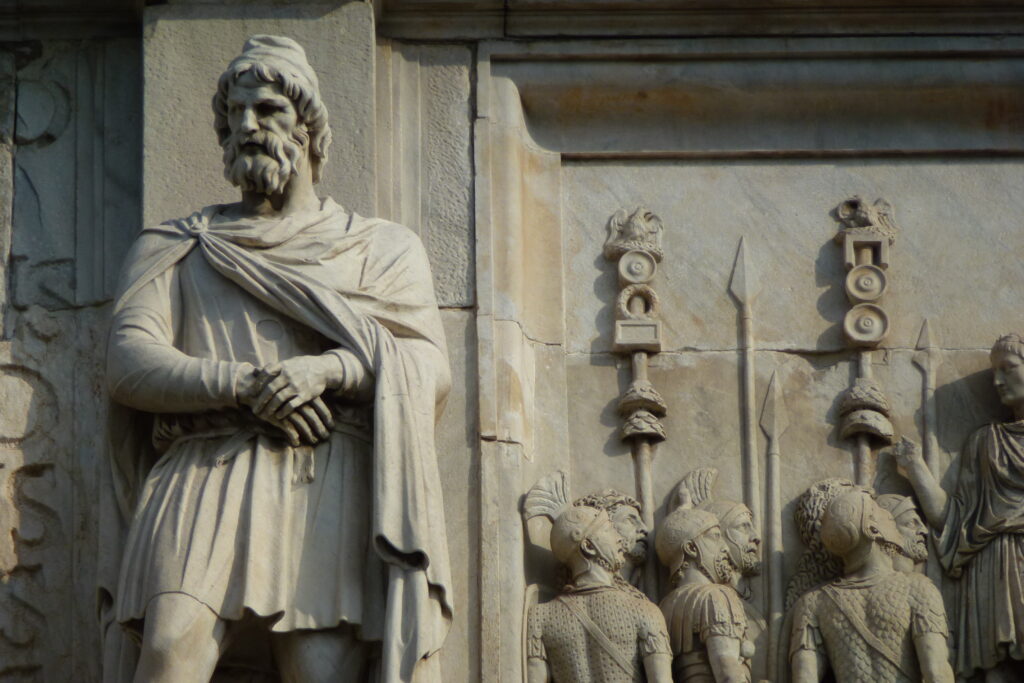
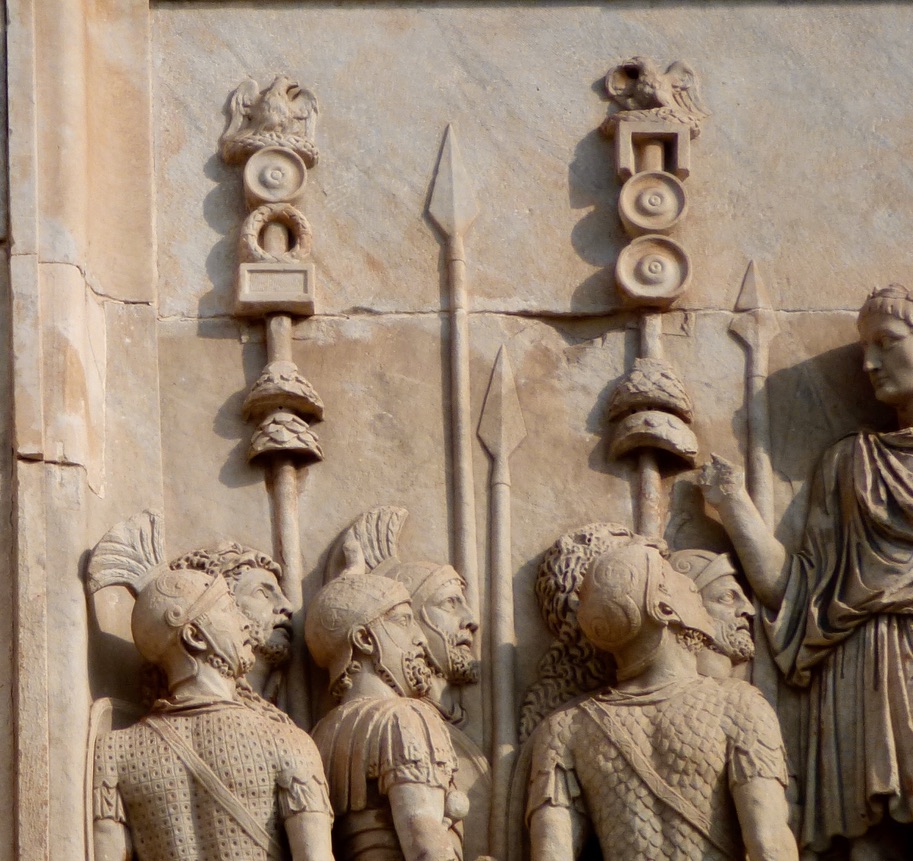
Aquila
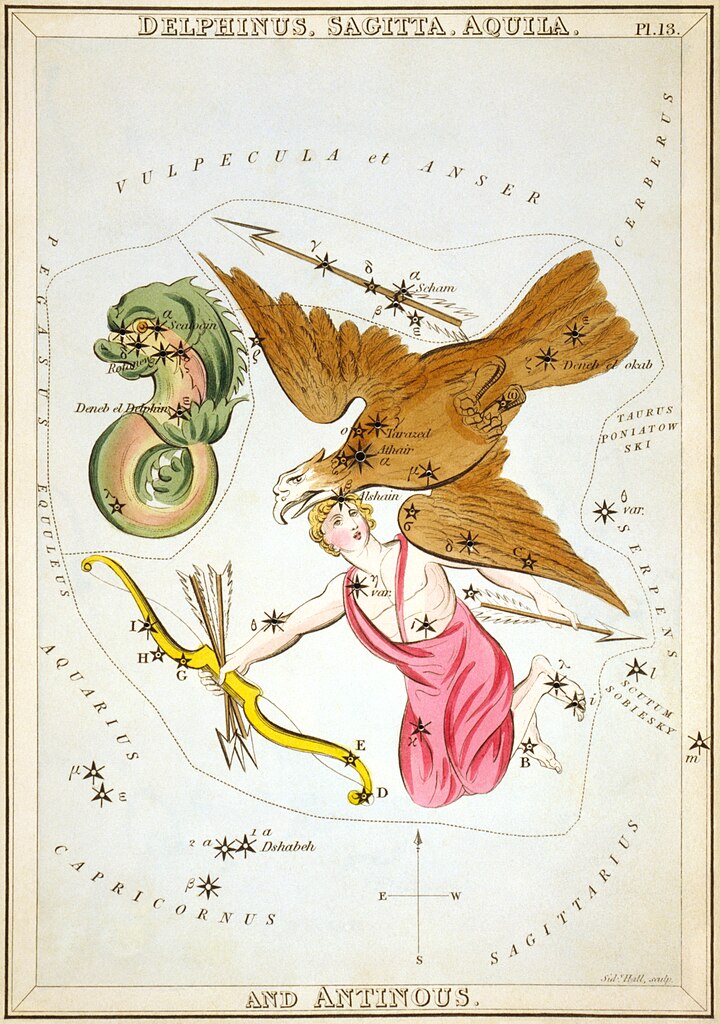
Two of the Schubert song texts refer to the star constellation Aquila (the eagle).
Der Welten erschuf, dort des Tags sinkendes Gold,
Und den Staub hier voll Gewürmegedräng, wer ist der?
Es ist Gott! es ist Gott! Vater! so rufen wir;
Und unzählbar, die mit uns rufen, seid ihr!
. . .
Die Ros' in dem Kranz duftet Licht! Königlich schwebt,
In dem Blick Flamme, der Adler, gebeut Gehorsam
Den Gefährten um sich! Stolz, den gebognen Hals,
Und den Fittig in die Höh, schwimmet der Schwan!
He who created worlds, both the day's sinking gold over there
And the dust here, full of writhing worms, who is he?
He is God! It is God! Father! Thus we call out;
And let countless others call out with us!
. . .
The Rose in the garland smells of light! Swaying regally
In the light of the flames is the eagle Aquila, with obedient
Companions bent around it! Proudly, with its neck arched
And its wings held high, swims Cygnus the swan!
Klopstock, Die Gestirne D 444
Wie wohl ist mir im Dunkeln!
Wie weht die laue Nacht!
Die Sterne Gottes funkeln
In feierlicher Pracht!
Komm, Ida, komm ins Freie,
Und lass in jene Bläue,
Und lass zu jenen Höhn
Uns staunend aufwärts sehn.
Sieh, wie die L e i e r schimmert!
Sieh, wie der A d l e r glüht!
How well I feel in the darkness!
How mildly the breezes of night waft past!
God's stars sparkle
With a celebratory magnificence.
Come, Ida, come into the open space
And let us look up into that blueness
And let us look up into those heights
Let us look upwards in astonishment.
Look at how Lyra (the lyre) is shimmering,
Look at how Aquila (the eagle) is glowing!
Kosegarten, Die Sterne D 313
Both poets, Klopstock and Kosegarten, suggest that the only possible response to contemplating these constellations is awe. We should feel astonished and grateful to behold the majesty of the universe. We look up and we behold eyes looking down on us. Eagle eyes in the case of Aquila. We are made to feel small but at the same time our act of looking and admiring is an essential part of the experience. There is nothing here portraying the eagle as a symbol of arbitrary power or the possibility of catastrophe.
Ornithology
Most of the eagles in the Schubert song texts are symbols rather than birds. There is an exception in Schiller’s Der Flüchtling, though. Here, eagles are part of the vibrant life from which an outcast refugee feels excluded. The eagles go about their own business with no apparent concern for the humans below them.
Wie hoch aus den Städten die Rauchwolken dampfen!
Laut wiehern und schnauben und knirschen und stampfen
Die Rosse, die Farren;
Die Wagen erknarren
Ins ächzende Tal.
Die Waldungen leben,
Und Adler und Falken und Habichte schweben
Und wiegen die Flügel im blendenden Strahl.
How high above the towns the
Clouds of smoke rise up!
There is loud neighing, snorting, grinding and stamping from
The horses and the bulls;
The carts creak
Into the groaning valley.
The woodlands are alive,
And eagles, falcons and hawks glide
And beat their wings in the dazzling glow.
Schiller, Der Flüchtling D 67, D 402
Unfortunately, eagles cannot always keep themselves separate from the human domain, and in Schober’s Jägers Liebeslied they are shot and killed for no good reason.
Ich schieß den Hirsch im grünen Forst,
Im stillen Tal das Reh,
Den Adler auf dem Klippenhorst,
Die Ente auf dem See.
Kein Ort, der Schutz gewähren kann,
Wenn meine Flinte zielt,
Und dennoch hab ich harter Mann
Die Liebe auch gefühlt.
I shoot the deer in the green forest,
The roe in the quiet valley,
The eagle on its nest on the cliff-face,
The duck on the lake.
There is no place that can offer protection
When my shotgun takes aim;
And yet, hard man that I am, I have
Also felt love!
Schober, Jägers Liebeslied D 909
It appears that the poet is wanting to portray himself as hard and manly to emphasise how remarkable it is that he also has a sensitive side. Shooting an eagle on its nest (and thereby dooming the eggs and the chicks) hardly seems heroic, though. The killing is not for food but for fun. No eagle would ever behave like that.
☙
Descendant of:
AnimalsTexts with this theme:
- Leichenfantasie, D 7 (Friedrich von Schiller)
- Die Sterbende, D 186 (Friedrich von Matthisson)
- Don Gayseros, D 93 (Friedrich Heinrich de la Motte Fouqué)
- Hermann und Thusnelda, D 322 (Friedrich Gottlob Klopstock)
- Die Sterne (Wie wohl ist mir im Dunkeln), D 313 (Ludwig Theobul Kosegarten)
- Ganymed, D 544 (Johann Wolfgang von Goethe)
- Lebens-Melodien, D 395 (August Wilhelm Schlegel)
- Der Flüchtling, D 67, D 402 (Friedrich von Schiller)
- Die Gestirne, D 444 (Friedrich Gottlob Klopstock)
- Jägers Liebeslied, D 909 (Franz Adolph Friedrich von Schober)
- Jünglingswonne, D 983 (Friedrich von Matthisson)


